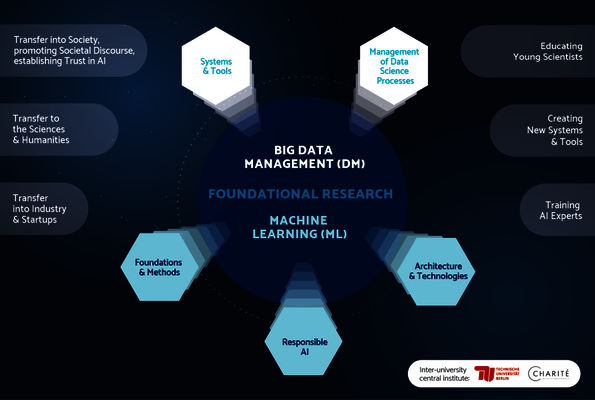About BIFOLD
Cross-linking Machine Learning and Big Data Management
The Berlin Institute for the Foundations of Learning and Data (BIFOLD) has evolved in 2019 from the merger of two national Artificial Intelligence Competence Centers: The Berlin Big Data Center (BBDC) and the Berlin Center for Machine Learning (BZML). It is one of Germany's six national AI centers, receiving permanent funding from the State of Berlin and the Federal Ministry of Education and Research. BIFOLD is based at TU Berlin, institutional partner is the Charité - Universitätsmedizin Berlin.
Currently BIFOLD consists of 12 researchgroups with >150 employees, a Graduate School and the BIFOLD Office. It also involves Fellows from Berlin's major universities, Charité - Universitätsmedizin Berlin, as well as various other national and international universities or non-university research institutions.
BIFOLD scientists have received numerous scientific awards, including the Leibniz Prize, Berlin Science Award, Vodafone Prize, Leopoldina membership, and international accolades.
BIFOLD aims at fostering gender equality, diversity and good research practice
BIFOLD, as one of the six national centers of excellence for research in Artificial Intelligence, is at the forefront of research in Machine Learning and Data Management in Germany. To fulfill the high standards of reliability and reproducibility in research, BIFOLD has established measures for Good Research Practice at the institute. Furthermore, BIFOLD strives to become a modern research institute and employer. Thus, BIFOLD aims to foster Gender Equality and Diversity within the institute. This is important not only for creating a modern work environment but also for forming diverse research teams to enhance the excellence of its research.
The documented measures are to be regarded as 'living documents,' which means that they will be expanded and updated over time to incorporate up-to-date academic knowledge regarding gender equality and diversity at universities, as well as the experiences gained within the institute.
More information:
Our Mission
BIFOLD conducts groundbreaking foundational research in Big Data Management (DM) and Machine Learning (ML), as well as their intersection, to educate the talents of the future and to create high-impact knowledge.
Scalable & Agile Research
Data management and machine learning are the scientific and technical pillars powering the current wave of innovation in artificial intelligence (AI); it is the efficient processing and intelligent analysis of very large, complex, heterogeneous data that has the potential to revolutionize and substantially improve our lives and societies. BIFOLD conducts scalable yet agile foundational AI research. Furthermore, it addresses the emerging challenges and requirements created by the rapidly growing importance of data management and machine learning in practically all areas, from medicine, industry, natural sciences, humanities, e-commerce, and media, to government and society. Key thematic areas of BIFOLD include scalable data management (Big Data) and machine learning, management of data science processes, new AI architectures and systems, responsible data management and explainable AI.
Our Research Groups:
Database Systems and Information Management
Big Data, Data Streaming, Distributed Data
Machine Learning
Interpretable ML Methods, Data Modeling, Anomaly Detection
Data Integration and Data Preparation
Databases, Data Integration, Data Mining
Management of Data Science Processes
Data Management for ML, Responsible Data Management, Debugging of ML pipelines
Medical Informatics
AI-supported clinical decisions support systems, Data science applications in healthcare, Deep Learning
Machine Learning in Pathology
Big Data Engineering
Data Science Abstractions and Systems, Performance-Accuracy Tradeoffs in Data Science, Data Cleaning Pipelines and Optimization
Big Data Analytics for Earth Observation
Data Management and Machine Learning for Earth Observation
Machine Learning and Security
Intelligent Security Systems and Attack-Resilient Machine Learning
Explainable Machine Learning in Medicine
Explainable AI, Machine Learning, Medical Applications
Probabilistic Modeling and Inference
Probabilistic Modeling, Bayesian Inference, Uncertainty Estimation
Intelligent Biomedical Sensing
Biomedical Engineering & Multimodal Data Analysis for Wearable Neurotechnology
Machine Learning for Molecular Simulation in Quantum Chemistry
Many-Body Dynamics, Physics-Informed Models, Numerical Methods
Distributed Data Stream Processing in Heterogeneous Environments
Heterogeneous Data Streams, Distributed Fog and Edge Environments, IoT Data and Application Management
















